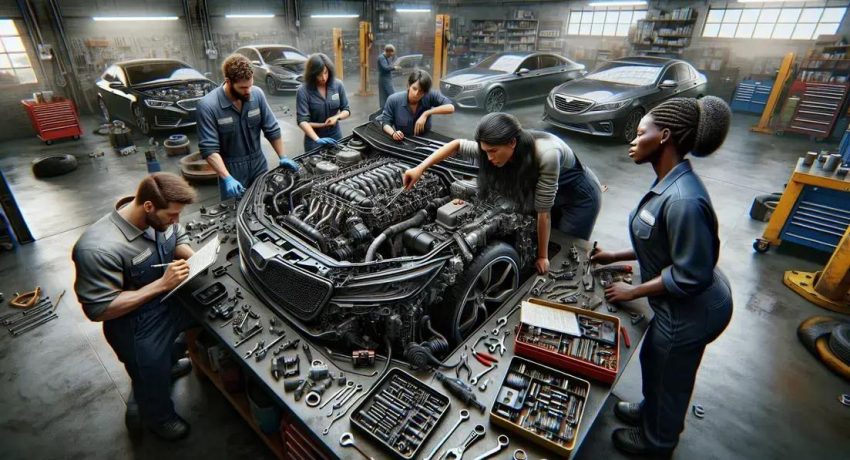To improve engine performance, consider effective upgrades like performance chips, cold air intakes, and high-performance exhaust systems, while maintaining regular maintenance for optimal efficiency.
How to improve engine performance is a question many car owners ponder at some point. We all want our vehicles to run smoothly and efficiently, right? Let’s explore some meaningful ways to enhance your car’s performance.
Table of Contents
ToggleUnderstanding engine performance metrics

Understanding engine performance metrics is crucial for optimizing your vehicle’s efficiency. These metrics provide insights into how well your engine performs under various conditions. Common metrics include horsepower, torque, fuel efficiency, and emissions levels.
Horsepower and Torque
Horsepower measures the engine’s power output. It indicates how quickly your vehicle can accelerate. On the other hand, torque reflects the engine’s pulling power, which is essential for tasks like towing or climbing hills. Balancing these two metrics is key for a well-rounded performance.
Fuel Efficiency
Fuel efficiency is often expressed in miles per gallon (MPG). A higher MPG means your vehicle can cover more distance on less fuel, saving you money over time. Factors affecting fuel efficiency include driving habits, tire pressure, and engine condition.
Emissions Levels
Measuring emissions levels is important for environmental impact. Modern engines aim to reduce harmful emissions through advanced technology and better fuel management. Keeping your engine in good condition not only enhances performance but also complies with environmental regulations.
Measuring Performance
To measure these metrics, consider using tools such as a dynamometer. This device can offer a detailed analysis of your engine’s performance, helping you pinpoint areas for improvement. Regular monitoring of performance metrics can help maintain optimal function and longevity for your engine.
Effective upgrades to boost engine efficiency

Implementing effective upgrades can significantly enhance your engine’s efficiency and performance. These upgrades can range from simple modifications to advanced technological changes that optimize how your engine operates.
Performance Chips
One popular upgrade is installing a performance chip. This device improves engine mapping for better fuel efficiency and power output. It adjusts variables such as fuel-air mixtures and ignition timing, ensuring your engine runs smoothly.
Cold Air Intakes
Another effective upgrade is a cold air intake. This system allows cooler, denser air to enter the engine, enhancing combustion and improving performance. A cold air intake can increase horsepower and acceleration while also boosting fuel efficiency.
High-Performance Exhaust Systems
Upgrading to a high-performance exhaust system can also benefit your engine. Such systems minimize back pressure and improve exhaust flow, allowing your engine to breathe better. This can lead to increased power and sound enhancement, making the driving experience more enjoyable.
Regular Maintenance
Don’t forget that regular maintenance is essential for engine efficiency. Keeping your engine well-tuned, along with regular oil changes, ensures that all components function optimally. Addressing issues like air filter replacements will also keep your engine running smoothly.
Tire Upgrades
Lastly, consider upgrading your tires. While not directly an engine component, having the right tires with low rolling resistance can improve fuel efficiency and handling. Proper inflation also plays a key role in optimizing performance.
Enhancing Engine Efficiency
Improving your engine’s performance is achievable through various upgrades and regular maintenance. From installing performance chips to upgrading exhaust systems, each change can lead to better fuel efficiency and power.
Don’t forget that routine check-ups and proper tire maintenance also contribute to overall efficiency. These steps ensure your engine operates at its best, providing a smooth and enjoyable driving experience.
Investing time and resources into these upgrades can lead to long-term savings and a more reliable vehicle, making it worthwhile for any car owner.
FAQ – Frequently Asked Questions about Improving Engine Performance
What are the key metrics to monitor for engine performance?
Key metrics include horsepower, torque, fuel efficiency, and emissions levels. Monitoring these helps optimize engine performance.
How can performance chips enhance my engine?
Performance chips optimize engine mapping, improving fuel efficiency and power output by adjusting factors like fuel-air mixtures and ignition timing.
What benefits does a cold air intake provide?
A cold air intake allows cooler, denser air into the engine, enhancing combustion and improving performance, thus increasing horsepower and efficiency.
Why is regular maintenance important for engine efficiency?
Regular maintenance ensures that all engine components function optimally, helps prevent issues, and keeps the engine running smoothly.
How do high-performance exhaust systems help my engine?
High-performance exhaust systems reduce back pressure and improve exhaust flow, allowing your engine to breathe better and increasing overall power.
Can upgrading tires affect engine performance?
Yes, the right tires with low rolling resistance can improve fuel efficiency. Proper tire inflation is also crucial for optimizing performance.






